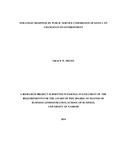| dc.description.abstract | Globally, the public sector remains a central vehicle for delivering development for both
developed and developing countries. To cope with the increased complexity, hostility and
turbulence within today’s organizational environment, public sector organizations across the
globe have been forced to embark upon far-reaching programmes of strategic change. Efforts
to realize economic and allocative efficiency, equity, justice, fairness, security,
competitiveness and contestability remain a priority of governments of today. This therefore
means that as one of the institutions in the public sector, the Public Service Commission
(PSC) has an obligation to increase efficiency and effectiveness in its service delivery to the
citizens of Kenya. This study was therefore conducted to investigate the strategic responses
by Public Service Commission (PSC), Kenya to changes in its environment. The study sought
to find out how changes in the Commission’s mandate; political, economic, socio-cultural,
technological, environmental and legal (PESTEL) factors have determined the strategic
direction that PSC have taken. To achieve this objective a case study was undertaken
whereby four departmental heads were interviewed. Content analysis was used to analyze the
data collected. Out of the targeted respondents eighty percent were available for the
interview. From the study it emerged that PSC has responded proactively to the
environmental changes through timely development of relevant policies and operational
mechanisms with the aim of ensuring that it delivers its mandate as per the Constitutional
requirements. This explains the Commission’s ranking among the top ten best performing
government entities during the financial year 2011/2012. From the findings the researcher
recommends a need for increased financial resources as well as an enabling environment in
the ICT sector from the national government to enhance the Commission’s strategic
endeavours. Additionally, besides the fact that the Commission has a communication strategy
in place, there is still a need for PSC to develop an all inclusive communication strategy in
order to address language communication barrier. Translation of important information
affecting the nation into the different Kenyan languages will promote the principle of
inclusiveness and hence increase awareness of PSC’s existence as a government department
and its constitutional role as a government recruitment agency. | en_US |

